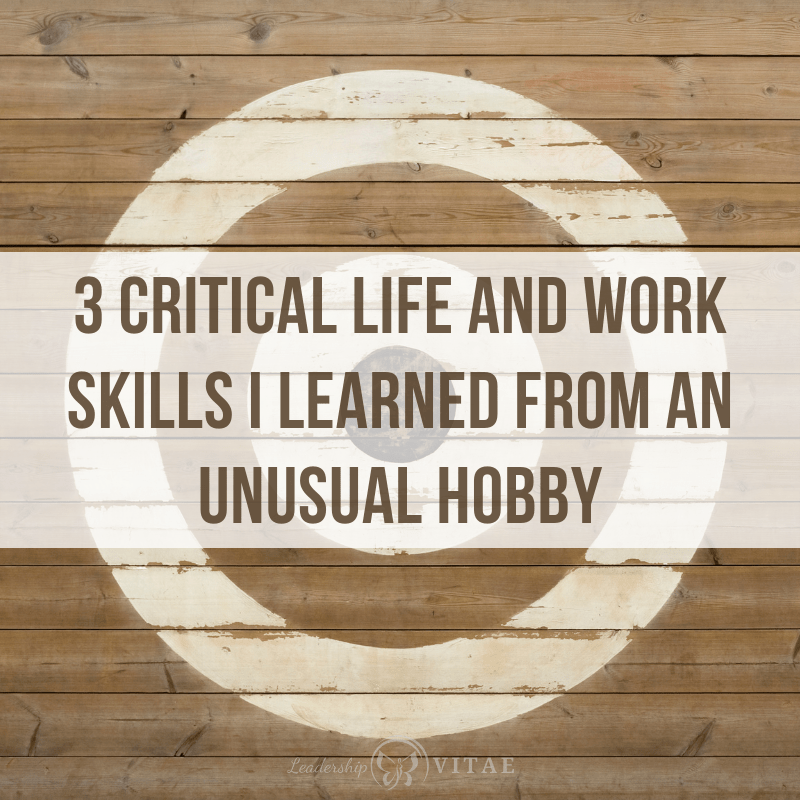
When I started working in software development, I moved from short-term projects to multi-year programs. Rather than get more immediate feedback from faster delivery timeframes, suddenly it might be many months before my team and I saw results.
It was during this time that I started my multi-potentialite journey in earnest. Before, I would have called myself a serial hobbyist. Yet with each interest, I was developing skills that I could bring back into my professional life.
Investing in outside passions can make us better employees and leaders at work. They often provide skills that can complement our professions. Help us bring a fresh and creative perspective to the job, which is critical in the world of disruption.
All of my outside passions have fostered development of new skills. It was my father who introduced me to my first one. He even told me how it helped him in his work and introduced me to the idea that a hobby could make me a better employee and leader.
That first passion was professional rifle shooting. From there, every hobby has provided me with an adjacent or complementary skill that I can bring to work to be more innovative.
I recognize this particular hobby isn’t for everyone, and it’s one I put away years ago. Yet I still call on the skills it taught me.
1. Control the mind and body
There is proven value in mindfulness and meditation. Yet it’s never been a particular strength of mine, even with practice. Except when I’m competing.
It started the first time I picked up a rifle to shoot a target at 100 yards. And then attempted to put 4 more bullets in the exact same spot. That can’t happen when your mind is racing. When your body isn’t your own.
It requires control of your breathing. A single-minded focus. Stillness.
As someone who is always on the move, it came surprisingly easy from that very first day. Later, I applied it to running or cycling races. And eventually at work.
While my brain is always on the move, and my body often as well, I’ve found ways to slow and still. To close my eyes and shut out the noise around me to find focus. To “see” clearly in my mind’s eye when there are distractions all around me.
I’m not sure I would even know what that feels like if I hadn’t found it in competition. It is still a struggle at times, but that early experience taught me more than a book or app could. It proved that I had the capacity in me to pull from.
2. Monitor the environment
Even if we can control ourselves, rarely can we control the environment around us. We may be able to influence it, but that’s a big maybe. When it comes to the weather, mother nature will win every time.
During competition, I needed to be aware of the influences around me. Ones I could not control but would impact my success.
I had to be aware of the elements, like rain, or wind direction, speed, and temperature. Of any outside influence that could change the conditions I was operating under and adjust accordingly. There was no controlling mother nature, but I could control myself and how I responded.
At work, it taught me to be aware of context that influences outcomes. It would be easy just to focus on the job at hand and getting it done to the best of my ability. Unfortunately, sometimes that isn’t enough.
We may have to get our work done in partnership with different teams. There may be political influences that affect our budget, resourcing, or tools. Any number of outside factors that can impact our work.
Rather than fight them, I learned to be aware. Influence what I can and adjust to what I can’t. I could rail at the wind, but it’s going to keep blowing. Instead, I can know which direction it’s headed and do my best to work with it so it doesn’t blow me off course.
3. Know the target
In professional shooting, there are various distances and targets, all with their own rules. Sometimes, I’d have to put 5 bullets in the same hole at long distances. Others, I’d put 5 bullets in different targets, within a set timeframe and distance.
In every situation, I needed to know what was expected. As the target and rules changed, I had to adjust my approach. To win, I needed to know what I was aiming for and what success looks like.
The same has held true in work. As I have changed roles, teams, and organizations, the rules have changed. My new job has cultural norms that are very different than my last. If I kept following the same rules, I’d fail. With the new rules, I know what success looks like and can adjust accordingly.
Each time we find ourselves in a new place, with new people, doing new things, we must adjust. Control ourselves, know the context we’re operating in, and be aware of the rules in play. Only then can we be successful, regardless of where we find ourselves.
The world awaits
Recently I was talking with someone on an adjacent team. He mentioned his hobbies all revolve around work. Tech reading and classes dominate. Always learning, but in topics that are aligned with his day job.
It’s awesome that he’s committed to gaining depth in a chosen field of expertise. Unfortunately, he often thought of unaligned interests as time wasters. I shared some examples of outside passions and the alternate views they’ve brought me over the years. How those “time wasters” each provided a return on investment.
We talked through a few of his other interests and how they might offer him a different perspective on his work. Suddenly, he had a world of opportunity available to him.
If we see hobbies as frivolous, we might hesitate to invest time in them. Yet creativity, competition, teaching – whatever form our hobbies take – can offer us adjacent or complementary skills we can bring back to our day jobs.
While I sometimes miss competition, I’ve found new ways to challenge myself over the years. New things to master and integrate back into my work. Rather than consider myself a serial hobbyist, I now embrace multi-potentiality as my goal.
How have your outside interests helped you develop at work? I’d encourage you to share your thoughts in the comments below.








